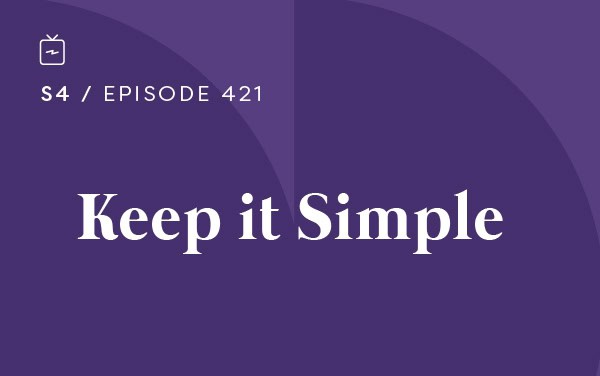
by Kris Oyen | Mar 13, 2023 | Podcast
Podcast: Play in new window | Download
Subscribe to the Recovery Elevator Podcast Apple Podcasts | | More
Episode 421 – Keep It Simple
Today we have Stephanie. She is 44 from Georgetown, MA and took her last drink on September 6, 2020.
Recovery Elevator podcast just surpassed 10 million downloads! Thank you to our guests, all the team members, Café RE members, and especially our listeners!
Exact Nature: https://exactnature.com/RE20
[2:49] Highlights from Paul:
In an age where almost everything plugs in, we as human beings do not. Often when we are feeling upset or triggered, one (or more than one) aspect of H.A.L.T is at play. Try and ask yourself if you are Hungry, Angry, Lonely and Tired.
Paul gives us a lot of suggestions of simple ways to address these feelings and asks the listener – how do you keep it simple? Let us know on Monday’s post on Instagram in the comment area!
Better Help: www.betterhelp.com/elevator – 10% off your first month. #sponsored
[10:42] Paul introduces Stephanie:
Stephanie took her last drink on September 6th, 2020. She is 44 years old, lives in Georgetown, Massachusetts. She is married and has two boys, ages 7 and 9, and two dogs. She enjoys walking and running and loves all things sci-fi.
She first started drinking when she was 15 with an 18 year old boyfriend. She was socially anxious, and drinking helped with that. There were very few consequences and she says it was at least once a weekend she drank, but never drank at home and wasn’t exposed to alcohol at home. She did well in school and followed the rules at home.
She drank in college and went out with her friends typically Thursday through Saturday but did well in school during the week. She was able to dodge some consequences, but the behavior continued. The drinking gradually began happening more frequently especially after she started dating someone and they spent a lot of time going out and drinking together.
She ended up getting married and they moved to Arizona. Their relationship was surrounded by alcohol, and it started to become obvious that they couldn’t take nights off and that was an issue. They split up and she moved back home to Boston. While she was excited for the next chapter of her life, she ended up starting to drink alone which was a red flag to her. She met her husband and they had a lot of fun together, even though they drank. Nothing serious happened, but she still felt that she was drinking too much. She was able to quit while she was pregnant and realized during the second pregnancy that she was wanting it to hurry up so she could start drinking again. Shortly after that she moved from bottles of wine to boxes.
Around the beginning of the pandemic, she told her husband that she was going to quit, but she wasn’t able to. She started hiding mini bottles and realized she started drinking earlier and earlier in the day. She was starting to have physical pains and was saddened by what she saw in the mirror. She was feeling more and more disconnected and realized that she wanted to change this so she could connect and be more present with her children.
Due to the pain, she was having, Stephanie decided to make an appointment with her doctor and got some alarming results. She decided to come clean with her husband and let him know what’s been going on and that she was ready to quit drinking. He was very supportive which she wasn’t expecting.
Stephanie realized that she had to do things differently. Moderation had never worked in the past, so she knew that wasn’t an option this time. Three big things she did were she told the truth about her addiction, found a community whose language she really resonated with, and ensured she consistently had an hour to herself where she would listen to podcasts and walk. She is looking forward to doing some international travel sober, which she hasn’t done before, and she is excited to continue being a more present parent and partner.
Connect with Cafe RE Use the promo code OPPORTUNITY to waive the set-up fee.
Recovery Elevator YouTube
Recovery Elevator
You can do this
I love you guys
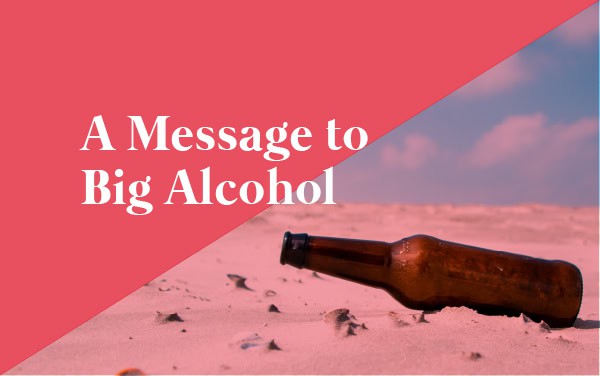
by Kerri MacFarlane | Jan 14, 2023 | Alcohol Free, Big Alcohol, Early Sobriety, Expectations, Resources
406 episodes of the Recovery Elevator Podcast were released before there was an intro with the main message being addressed to Big Alcohol. Why do you think that is? That’s a lot of Mondays to not tell Big Alcohol what we think, (or where to stick it ?). Why wasn’t this addressed before episode 407: A Message to Big Alcohol…?
Well, like Paul said…we have limited time together and it feels like a better use of our time discussing how to build a new life that no longer requires alcohol, instead of fighting Big Alcohol, or fighting the past.
In fact, although you may not feel like it right now…if you keep moving forward, if you don’t quit quitting, and you keep doing the next right thing, one day at a time…you may just find yourself thanking Big Alcohol for giving you the life you have today. Crazy to imagine, right? I know it was for me. But it absolutely is true today. I am thankful for where my struggle with Big Alcohol has led me.
So here we are…let’s call out a couple of things regarding Big Alcohol, and maybe, there is a way we can work together.
First off, let’s get real for a second Big Alcohol. We both know your business model doesn’t survive off normal drinkers. Your lights are on, your doors are open, salaries are paid because of problematic drinkers…aka: alcoholics.
This is called the 80/20 rule in business and for Big Alcohol, it’s probably a 90/10 rule. This means that 90% of revenues are coming from 10% customers.
Let’s take a normal drinker. This is someone who buys a six pack of Coors Light, drinks 2-3 beers, and the remaining 3-4 cans sit in the refrigerator in the garage for the next couple weeks or months.
That is one type of customer.
Then take the alcoholic. This is someone who buys a 12, 18, 24, or 30 pack of Coors Light… daily. Where do you think your revenue is coming from? This question is rhetorical because they already know this.
Big Alcohol, we bring this up because there needs to be accountability on your part…and here’s some reasons why:
◾️Yes, it’s the individual who is drinking excessively, but the data and science support that alcohol is the most dangerous and addictive drug on the planet.
It kills more people each year than every other drug combined. An estimated 40-75% of occupied hospital beds have underpinnings to alcohol. In 2010, a Doctor named Dr. David Nutt, hired by the British government, was tasked to put a harm score on the world’s 20 most addictive drugs. Alcohol came in at #1. In 1958 the American Medical Association classified alcoholism as a disease.
◾️No amount of alcohol consumed is beneficial to the consumer.
This a myth that you, Big Alcohol, tries to perpetuate. In the Mid 2010’s the government funded agency the NIAAA (National Institute on Alcohol Abuse and Alcoholism) performed a study to see if alcohol consumption was good for you.
The answer was…YES. Say whattttt?? ? However, it then became known the study was funded by Big Alcohol. No surprise the answer was yes! ?
In reality, no quantity of ethanol is good for you. The Huberman Lab Podcast has a fantastic episode about the effects of alcohol on your mind and body. The Stanford University Neuroscientists confirmed that no amount of alcohol is good for you.
◾️And let’s talk trash, garbage or waste.
A couple months ago Paul had new brakes installed on his vehicle and he rode his bike home from the mechanic after dropping off his truck. He took a scenic county road home for about 7 miles. While hugging the side of the road he was astonished by the amount of empty alcohol containers that littered the shoulder.
Keep in mind, this was in the part of the grass that had been maintained. Paul said he guessed there was triple or quadruple the amount of empty bottles and cans in the taller grass. (Now to be fair, he did see empty gatorade bottles, and trash that was not related to alcohol, but he said if he had to guess it was a 10/1 ratio.). Paul estimated there was an empty alcohol container every 100 feet (and that’s a safe estimate). With some easy math that put 52 bottles, or cans, every mile totaling over 350 pieces of trash on his 7 mile bike ride. That figure would be way higher if one were to walk through the taller grass.
This past October Paul did a retreat in Peru. One of their tasks was to pick up trash around a sacred temple about 20 miles outside of Cusco, which once was the capital of the Inca Empire. They filled about 4 trash bags, and again about a 10/1 ratio of alcohol containers to other trash.
Big Alcohol’s footprint is all over the globe; societal wreckage, physical disease, and in the form of excessive trash.
As human beings there is a goal that many of us share. That is to make this world a better place. ??
Big Alcohol, let me ask you this question, are you making the world a better place?
What impact are you having on society? On the fabric of family systems? Are you adding or subtracting to this world? Are you a net benefit? Or a net drain? What do you stand for Big Alcohol? Are you okay with your customers discarding your product waste into nature? Into my backyard? Into your backyard? Big Alcohol, your name, your brand, your message is on these containers that end up in our streams, rivers, and oceans. By all concerns you are still tied to the product, but you are not shouldering the burden after the monetary transaction has taken place.
This. Needs. To. Change.
As we all work on cleaning up our internal wreckage and chaos it’s time that you, Big Alcohol, start doing the same.
We here at Recovery Elevator are calling you out, Big Alcohol, to lean up your mess. A disproportionate amount of trash in nature is yours. It’s the RIGHT thing to do – to pick it up. We have a yearly service project at Recovery Elevator, and we’d love your help. Maybe take 1/2 a percentage of your marketing budget and help us out.
Big Alcohol, if you want to work with us, we’re open to it. Our email address is info@recoveryelevator.com.
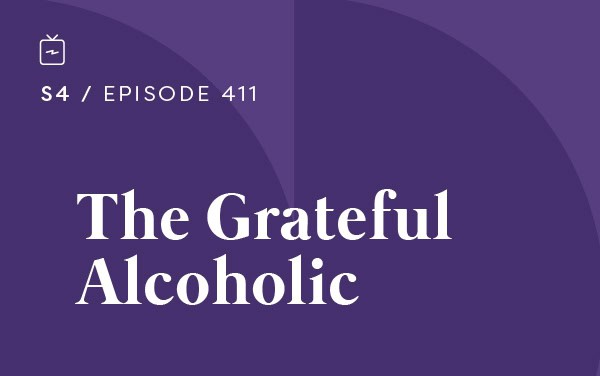
by Kris Oyen | Jan 2, 2023 | Podcast
Podcast: Play in new window | Download
Subscribe to the Recovery Elevator Podcast Apple Podcasts | | More
Episode 411 – The Grateful Alcoholic
Today we have Lisa who is 65 from Atlanta, GA took her last drink on 11/17/2022.
Whether you are on day 1 or day 1000, there is still time to join REStore. The next class is tonight at 8:30pm EST
There are still spots open for our next sober travel trip to Costa Rica from April 12th-21st for more information click the link Costa Rica 2023
Highlights from Paul:
Paul didn’t understand a fellow AA member’s references to being a “grateful alcoholic”. Only after getting to know Jim, did he understand what they meant. It took a few years for Paul to get to that point to be grateful for his addiction.
He reflects that our addictions are signposts trying to guide us to a more authentic life and that there are no such things as failures. They are learning opportunities and we should never give up. We should trust the process of healing from the addictions, and we can all become grateful for the role that alcohol has played in our lives.
Better Help: www.betterhelp.com/elevator – 10% off your first month. #sponsored
[00:00] Paul introduces Lisa
Her last drink was November 17, 2022 – a little over three weeks from the time of this recording. She says it feels wonderful, relieving, liberating, comforting, all positive things.
Lisa is 65 and lives in Atlanta area with her husband of 36 years. They have two grown children and remain close to them. She enjoys reading, travelling, exercise, nature and family time.
Lisa’s drinking started out on the weekends in high school. She drank throughout adulthood and always knew she drank abnormally. She discovered she had her first blackout and fell when she was nearly 50. That scared her into getting sober with AA but she feels she never did the work or found a good sponsor. After one year, she thought she could handle drinking again.
Over the last two or three years she has known she needed to stop again. She was starting to notice the health consequences and began finding resources including The Huberman Lab podcast episode about alcohol, and This Naked Mind.
Journalling about her drinking past has helped her recognize some of what drove her to addiction. She became aware that her drinking ramped up after she retired in 2015 as she felt a loss of identity. She has recently become a caretaker for her mother who has been in recovery since Lisa was 15, but they have never been close. She thinks she used alcohol for stress and anxiety relief over that and the loneliness she found in retirement. Now that she knows that it is her brain reacting to the disease which she finds helpful to her recovery. She embraces that she must do things differently this time and get comfortable with being uncomfortable. She has joined several recovery communities and asked to be on the podcast. She has not shared her journey with her immediate family but plans to do so very soon.
In recovery, Lisa says that routine is vital to her success. She exercises daily while listening to podcasts. She enjoys volunteering to stay busy. Her faith is very important to her and she finds prayer and journalling helpful.
One thing she has learned in sobriety – she can find the courage to do hard things and is stronger than she realized
Parting piece of guidance – you can control your thoughts, just focus on what you are gaining, not what you are losing.
[00:00] Closing thoughts from Paul:
Paul encourages us to stop labeling things as a problem. We need challenges to appreciate rewards. He compares this to alcohol as being the invitation to step into a rebirth and make great changes in our lives for the better. He has yet to meet someone that regretted quitting drinking. Paul also revisits his thoughts on Big Alcohol and his view on legalization of drugs and alcohol.
Connect with Cafe RE – Use the promo code OPPORTUNITY to waive the set-up fee.
Recovery Elevator YouTube – Subscribe here!
Sobriety Tracker iTunes
I love you guys.
We took the elevator down; we’ve got to take the stairs back up.
We can do this.
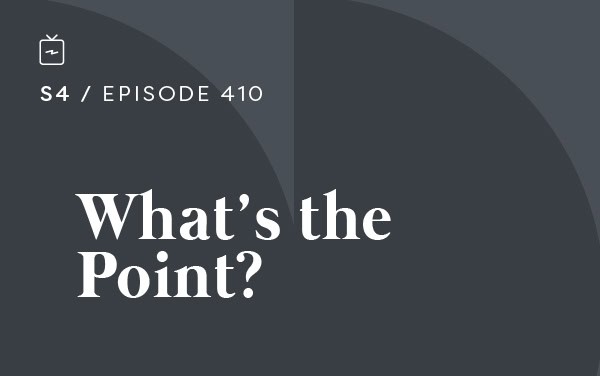
by Kris Oyen | Dec 26, 2022 | Podcast
Podcast: Play in new window | Download
Subscribe to the Recovery Elevator Podcast Apple Podcasts | | More
Episode 410 – What’s the Point?
Today we have Justin who is 37 from New York
Check out the AF drink recipes curated by Kate on the Recovery Elevator blog
NYE Sober Prom in San Diego on December 31st. We have Athletic Brewing, Sip Clean, Sound Soda and Crumbl Cookies sponsoring this event, open to Café RE members only.
Whether you are on day 1 or day 1000, there is still time to join REStore. We start this Sunday, please join us!
Highlights from Paul:
Many of us have asked the question “what’s the point of life?” The response is always a near derivative of love. It’s safe to say that the core religions can be summarized with one teaching. The Golden Rule. The mystics recognized, we are all one, what you do to another you do to yourself and if you treat your fellow human being with respect and dignity, you in turn will experience the same.
We have learned that we cannot find the point of it all at the bottom of a bottle. And when we hear The Golden Rule, we often think of the other person, but what about being kind to ourselves? Treat others as you’d like to be treated, but you need to treat yourself how you want to be treated. And only then, can we have a shot at learning about what this miracle we call life is all about.
Better Help: www.betterhelp.com/elevator – 10% off your first month. #sponsored
[10:00] Kris introduces Justin:
Justin has been sober since September 9th, 2020. He lives in Harrison New York. He is getting married next year, has two cats and two dogs. He loves running, traveling, and listening to podcasts and audiobooks.
When he was growing up, his first exposure to alcohol was his family having wine at the holidays and his dad drank beer. He remembers his father as inconsistent, and was very aware of the amount of beer that his father drank and was attuned to what was going on.
Justin first drank in around 7th grade but didn’t like where it was heading. Later he had a small circle of friends that he would drink heavily with late in high school. After transitioning to college alcohol was the gateway to making friends. He started making rules around his drinking early on and used it as a coping tool. He never felt he had a problem because he knew what a problem looked like.
After college, Justin continued to try and create rules around his drinking. Alcohol was more of a social connector and bars were everywhere and he couldn’t imagine life without drinking – it was normalized but he knew he was different, and that drinking wasn’t right for him.
It was when Justin had his first experience dating someone that didn’t drink that he realized it was possible to go out and be fully present and aware. He recognized that this was the person he wanted to be but was still dependent on alcohol. When he had 10 days of sobriety for a personal development course, but could not continue, he knew he had to address the problem. He started listening to audiobooks which helped him recognize what led to his addiction. He had a shift where he realized that he no longer wanted to use alcohol to cope with life. While running he started listening to recovery books and podcasts. He was able to start stringing sober days together and realized that he wanted to be a non-drinker. He started looking at his recovery scientifically and evaluated his sober vs. non-sober time.
He says his biggest tools involve audiobooks, podcasts, playing the tape forward and connection is the most important. You can connect with Justin in the links below:
Alternative Direction Coaching
This Naked Mind – Justin
CoachJustin450@gmail.com
[60:00] Thoughts from Kris
Radical honesty has been important for Kris and urges us to ask ourselves a few questions without judgement. Honesty can help us accept where we are and get the help that we need.
Connect with Cafe RE – Use the promo code OPPORTUNITY to waive the set-up fee.
Recovery Elevator YouTube – Subscribe here!
Sobriety Tracker iTunes
You’re the only one who can do this RE
But you don’t have to do it alone
I love you guys.
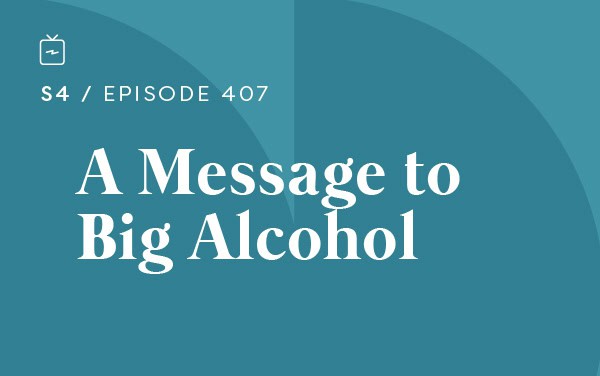
by Kris Oyen | Dec 5, 2022 | Podcast
Podcast: Play in new window | Download
Subscribe to the Recovery Elevator Podcast Apple Podcasts | | More
Episode 407 – A Message to Big Alcohol
Today we have Jeff, 48, from Joplin Missouri with 13 days of sobriety at time of recording
Registration for Restore opens December 1. https://www.recoveryelevator.com/restore/
Exact Nature: https://exactnature.com/RE20
Highlights from Paul
For the first time in this podcast, Paul speaks to Big Alcohol. Why now? We have a limited time together on each episode he has felt that discussing how to live a better life without the stuff is better use of our time.
He addresses the fact that Big Alcohol’s greatest customers are the alcoholic/problem drinkers and not the “normal” drinker that has one or two beers and the rest sits in the fridge for months. They are also responsible for perpetuating the myth that alcohol consumption is good for you. Spoiler alert: it’s not. The Huberman Lab Podcast has an episode that dives deep into the effects alcohol has on the brain/body. (https://hubermanlab.com/what-alcohol-does-to-your-body-brain-health)
The amount of trash that can be found on the sides of the road is about a 10/1 ratio alcohol related vs. non-alcohol related. Paul asks if Big Alcohol is ok with the remnants of their product being strewn all over the planet via human wreckage and excessive trash.
Paul clarifies that his goal is to not fight with Big Alcohol. His battle with alcohol and alcoholism made him who he is today, and he appreciates that.
But maybe they would be willing to share just a half of a percentage point of their marketing budget to help us clean up the mess their product has created both on humans and on our planet. We’d be interested to collaborate on our next service project. You can reach us at info@recoveryelevator.com
Better Help: www.betterhelp.com/elevator – 10% off your first month. #sponsored
[10:59] Jeff lives in Joplin, MO currently, but grew up in NC. He has a wife and three children aged 6, 4 and 8 months. He recently started his own business and enjoys golf, reading, creative writing and poetry, and writing and playing music.
Jeff took his first drink with a friend at home when he was 17. He remembers the occasional drink at a party in high school but didn’t really start drinking until he turned 21. Through his 20’s drinking was part of life. He was able to cut back or quit drinking whenever he felt it was getting to be too much.
Jeff says he didn’t have a true rock bottom moment but after an incident that found him ramping up his drinking, he chose to seek some counseling for PTSD. He started to realize that the way he had been drinking and handling life was becoming unsustainable. He wants to be present for his family and didn’t feel that he was able to enjoy life while drinking.
Jeff found himself going to his first AA meeting in many years 13 days ago, has found a sponsor and attends meetings daily. He has been staying busy with home projects and acts of service and feels that working with his hands relieves stress and helps him avoid getting lost in negative thought patterns.
Jeff doesn’t have a long-term goal in sobriety, he is just taking it day by day. Right now, he just wants to be sober and process his emotions without alcohol and enjoy his family and the life he has built.
[47:57] Paul’s Summary
Socrates said the secret to change is to focus all your energy not on fighting the old but on building the new. Mother Teresa said she would not participate in wars on hunger or on terrorism because there is an equal amount of disproportionate energy on the other side. Much like we have seen with the war on drugs: trillions of dollars wasted to learn that you cannot punish addiction out of people. If someone from Big Alcohol is listening, please don’t feel attacked, we want to work together in cleaning up the planet.
Resources
Connect with Cafe RE – Use the promo code OPPORTUNITY to waive the set-up fee.
Recovery Elevator YouTube – Subscribe here!
Sobriety Tracker iTunes
Recovery Elevator
This isn’t a no to alcohol, but a yes to a better life.
I love you guys







